(完整word版)外文翻译-国有企业会计监督体系的构建
国有企业会计监督体系的构建【精品发布】

国有企业会计监督体系的构建【精品发布】财务会计监督是提高财务会计信息真实性、准确性的有效途径,防范财务会计风险的手段,尤其在国有企业管理中具有重要意义。
但我国国有企业在经营的过程中,对财务会计监督体系的重要性还没有充分的认识,在监督制度的建立、监督队伍的组建和相关的规定上都没有满足实际工作的需求。
本文对我国国有企业财务会计监督体系中存在的问题进行了分析,并从提高财务会计人员的素质、加强企业内部管理及完善企业财务会计监督结构等方面提出了相应的应对措施。
重要词:国有企业;财务会计监督;措施企业的财务会计监督体系是由监督体系和监督人员组成的。
在企业的管理系统中,财务会计监督制度是不可缺少的重要组成部分,涉及到企业的财务会计信息管理、资金分配等多个方面的内容,甚至会对企业的经济效益、发展前景等产生较大的影响。
财务会计监督的主体包括企业的管理人员、企业内部的监管人员、其他部门的相关负责人、投资者和员工等。
企业的财务会计监督管理是对企业的财务会计信息进行整合和管理,并对资金的运转进行计划。
财务会计监督这一概念可以从广义和狭义上进行理解。
从狭义上来理解,财务会计监督是指企业的财务会计部门对企业内部的财务会计信息进行管理和监督,是通过一定的内部监督机制来实现的。
而广义上的财务会计监督不仅是对企业内部财务会计信息的监管,还有对项目负责人、审计部门等其他人员的管理。
一、国有企业财务会计监督的重要性我国国有企业正面临市场改革的巨大挑战,企业管理的内容和重点都有较大的调整,在企业的财务会计核算工作上,企业必须有效发挥自身的管理优势,通过合理的财务会计监督机制来确保企业的经营效率。
1.财务会计监督为国有企业改组提供保证在现代化的市场机制中,国有企业也必须进行一定的改组,实现经营模式上的完善和转变。
要有效的完成这一转变过程,国有企业必须认识到财务会计监督的重要性,合理利用财务会计监督的各项功能,使财务会计监督体制能为企业的改组带来一定的促进作用,更好的为企业中各个部门机构服务,达到企业的生产经营目标。
新形势下国有企业会计监督体制的构建
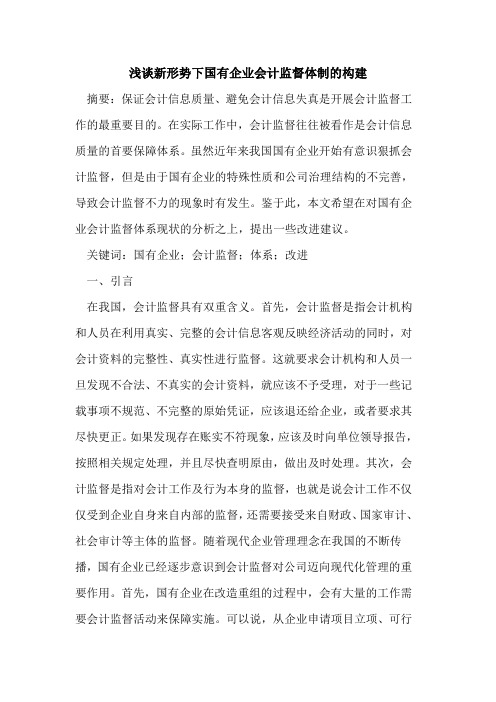
浅谈新形势下国有企业会计监督体制的构建摘要:保证会计信息质量、避免会计信息失真是开展会计监督工作的最重要目的。
在实际工作中,会计监督往往被看作是会计信息质量的首要保障体系。
虽然近年来我国国有企业开始有意识狠抓会计监督,但是由于国有企业的特殊性质和公司治理结构的不完善,导致会计监督不力的现象时有发生。
鉴于此,本文希望在对国有企业会计监督体系现状的分析之上,提出一些改进建议。
关键词:国有企业;会计监督;体系;改进一、引言在我国,会计监督具有双重含义。
首先,会计监督是指会计机构和人员在利用真实、完整的会计信息客观反映经济活动的同时,对会计资料的完整性、真实性进行监督。
这就要求会计机构和人员一旦发现不合法、不真实的会计资料,就应该不予受理,对于一些记载事项不规范、不完整的原始凭证,应该退还给企业,或者要求其尽快更正。
如果发现存在账实不符现象,应该及时向单位领导报告,按照相关规定处理,并且尽快查明原由,做出及时处理。
其次,会计监督是指对会计工作及行为本身的监督,也就是说会计工作不仅仅受到企业自身来自内部的监督,还需要接受来自财政、国家审计、社会审计等主体的监督。
随着现代企业管理理念在我国的不断传播,国有企业已经逐步意识到会计监督对公司迈向现代化管理的重要作用。
首先,国有企业在改造重组的过程中,会有大量的工作需要会计监督活动来保障实施。
可以说,从企业申请项目立项、可行性研究性报告、创立新公司、企业财产清查、产权界定等问题,都需要提供大量会计原始资料,而这些会计资料的真实性、合法性则需要健全有效的会计监督来加以保障。
其次,会计监督能够帮助国有企业实现价值最大化的运作目标。
国有企业在向现代公司制转型的过程中,需要充分发挥、挖掘会计监督的各项职能,使其能够更好地为企业的各个利益相关者服务,从而实现企业的经营目标。
二、国有企业会计监督体系存在的问题1.国有企业公司治理结构存在缺陷在我国朝着市场经济转轨的过程中,国有企业的公司治理问题一直都备受关注,其中的“内部控制人问题”尤其突出。
国有企业财务监管体系的构建
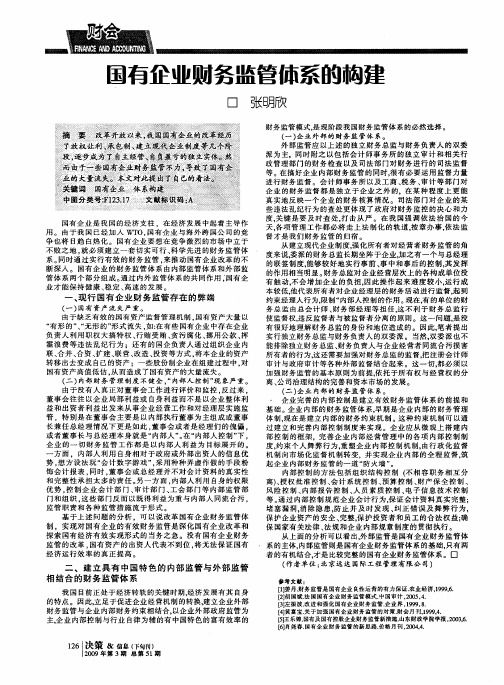
、
现行 国有 企业 财务 监管存 在 的弊端
( ) 一 国有 资产 流 失 严重 。 由于 缺 乏有 效 的国有 资 产 监督 管 理 机制 。 国有 资产 大 量 以 “ 形 的 ” “ 形 的 ” 式流 失 。 在 有 些 国有企 业 中存 在 企 业 有 、无 形 如: 负 责 人 利 用 职权 大 搞 特 权 、 贿受 贿 、 污腐 化 、 用 公 款 、 行 贪 挪 挥 霍 浪 费 等 违法 乱 纪 行 为 :还 有 的 国企 负责 人 通 过 组 织 企 业 内 联、 合并 、 合资 、 建 、 营 、 造 、 资 等方 式 . 本企 业 的资 产 扩 联 改 投 将 转移 出去 变成 自己的 资产 ;一些 股 份制 企 业 在 组建 过 程 中 , 对 国有 资 产 高值 低 估 , 而 造成 了国 有资 产 的大 量 流失 。 从 ( ) 二 内部 财 务 管理 制度 不健 全 , 内部 人 控 制 ” 象严 重 。 “ 现 由于 没 有人 真 正对 董 事 会 工 作 进 行评 价和 监 控 , 过 来 , 反 董 事 会 往 往 以 企业 局部 利益 或 自身 利 益 而不 是 以企 业 整 体 利 益 和 出资 者 利 益 出 发来 从 事 企 业 经 营 工作 和对 经 理 层 实 施 监 管 。特 别 是 在 董事 会 主要 是 以 内部 执 行 董 事为 主 组 成 或 董 事 长 兼 任 总 经 理 情况 下更 是 如 此 , 董事 会 或 者 是 经 理们 的傀 儡 , 或 者 董 事 长 与 总经 理本 身就 是 “ 内部 人 ” 在 “ 部人 控 制 ” , 。 内 下 企 业 的一 切 财 务 监 管 工 作 都 是 以 内 部 人 利 益 为 目标 展 开 的 。 方 面 ,内 部 人利 用 自 身相 对 于 政 府 或外 部 出资 人 的信 息 优 势 。 方 设 法 玩 “ 计 数 字游 戏 ” 采 用 种种 弄虚 作 假 的手 段 粉 想 会 . 饰会计报表 . 同时 . 董事 会 或 总 经 理 并 不对 会 计 资 料 的真 实 性 和 完 整 性 承 担 太 多 的责 任 。 一 方 面 , 另 内部 人 利 用 自身 的权 限 优势 。 制企业会计 部门 、 控 审计 部 门 、 会 部 门 等 内 部 监 管 部 工 门和 组 织 . 些 部 门反 而 以既 得 利益 为重 与 内部 人 同 流 合污 。 这 监 管 职 责 和 各 种监 管措 施 流 于 形 式 。 基 于 上述 问题 的 分 析 .可 以说 改 革 国 有企 业 财 务 监 管 体
论国有企业会计监督体系的构建
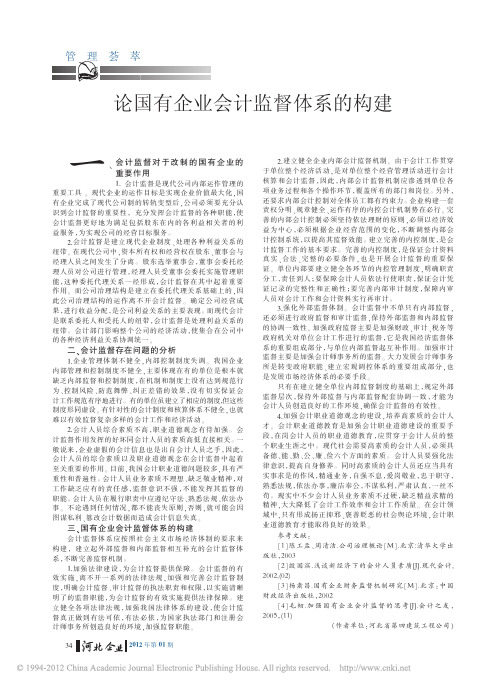
2会计监督对于改制的国有企业的重要作用1.会计监督是现代公司内部运作管理的重要工具。
现代企业的运作目标是实现企业价值最大化,国有企业完成了现代公司制的转轨变型后,公司必须要充分认识到会计监督的重要性,充分发挥会计监督的各种职能,使会计监督更好地为满足包括股东在内的各利益相关者的利益服务,为实现公司的经营目标服务。
2.会计监督是建立现代企业制度、处理各种利益关系的纽带。
在现代公司中,资本所有权和经营权在股东、董事会与经理人员之间发生了分离。
股东选举董事会,董事会委托经理人员对公司进行管理,经理人员受董事会委托实施管理职能,这种委托代理关系一经形成,会计监督在其中起着重要作用。
而公司治理结构是建立在委托代理关系基础上的,因此公司治理结构的运作离不开会计监督。
确定公司经营成果,进行收益分配,是公司利益关系的主要表现。
而现代会计是联系委托人和受托人的纽带,会计监督是处理利益关系的纽带。
会计部门影响整个公司的经济活动,使集合在公司中的各种经济利益关系协调统一。
二、会计监督存在问题的分析1.企业管理体制不健全,内部控制制度失调。
我国企业内部管理和控制制度不健全,主要体现在有的单位是根本就缺乏内部监督和控制制度,在机制和制度上没有达到规范行为、控制风险、防范舞弊、纠正差错的效果,没有切实保证会计工作规范有序地进行。
有的单位虽建立了相应的制度,但这些制度形同虚设。
有针对性的会计制度和核算体系不健全,也就难以有效监督复杂多样的会计工作和经济活动。
2.会计人员综合素质不高,职业道德观念有待加强。
会计监督作用发挥的好坏同会计人员的素质高低直接相关。
一般说来,企业虚假的会计信息也是出自会计人员之手,因此,会计人员的综合素质以及职业道德观念在会计监督中起着至关重要的作用。
目前,我国会计职业道德问题较多,具有严重性和普遍性。
会计人员业务素质不理想、缺乏敬业精神,对工作缺乏应有的责任感,监督意识不强,不能发挥其监督的职能。
会计人员在履行职责中应遵纪守法、熟悉法规、依法办事。
企业会计监督体系中英文对照外文翻译文献
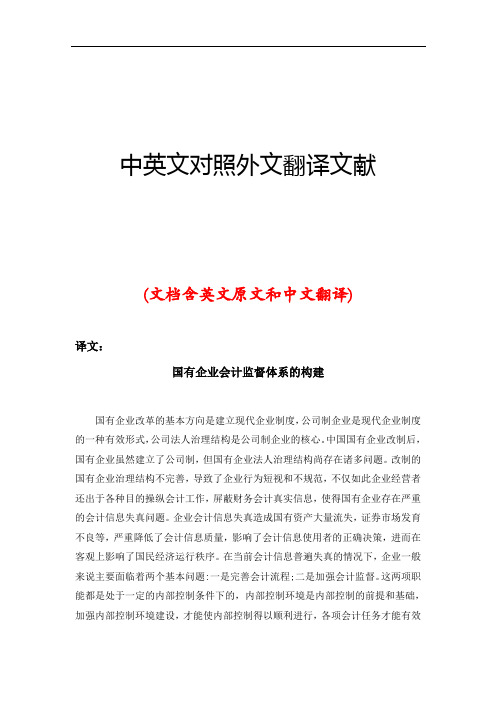
中英文对照外文翻译文献(文档含英文原文和中文翻译)译文:国有企业会计监督体系的构建国有企业改革的基本方向是建立现代企业制度,公司制企业是现代企业制度的一种有效形式,公司法人治理结构是公司制企业的核心。
中国国有企业改制后,国有企业虽然建立了公司制,但国有企业法人治理结构尚存在诸多问题。
改制的国有企业治理结构不完善,导致了企业行为短视和不规范,不仅如此企业经营者还出于各种目的操纵会计工作,屏蔽财务会计真实信息,使得国有企业存在严重的会计信息失真问题。
企业会计信息失真造成国有资产大量流失,证券市场发育不良等,严重降低了会计信息质量,影响了会计信息使用者的正确决策,进而在客观上影响了国民经济运行秩序。
在当前会计信息普遍失真的情况下,企业一般来说主要面临着两个基本问题:一是完善会计流程;二是加强会计监督。
这两项职能都是处于一定的内部控制条件下的,内部控制环境是内部控制的前提和基础,加强内部控制环境建设,才能使内部控制得以顺利进行,各项会计任务才能有效实施,会计信息质量才能真正提高。
然而,目前我国理论界在讨论会计信息失真问题时,大多强调制度的建设,却在一定程度上忽视内部控制环境的作用或者将内部控制环境与内部控制制度混为一谈。
故此,本文将从研究内部控制环境入手,将内部控制环境与会计监督相结合,通过探讨内部控制环境各要素对会计监督的影响来寻找一些切实可行的方法以提高会计信息质量。
会计监督是为保证会计信息质量、防范会计信息失真而对会计信息进行的各种监督。
会计监督被看作是会计信息质量的保证体系。
会计监督不力是导致会计信息失真的直接因素,会计监督问题对于完善公司治理结构有着重要意义,对于改制的国有企业更有特殊的强调意义。
我国在从计划经济向市场经济转轨过程中,由于内部人控制的弊端,以及外部监督、中介组织的缺陷,导致会计委派制的产生有了现实意义。
但会计委派制单独运行也存在一些问题,无法满足现代化管理的需要。
应该正确认识内部审计的必要性,将会计委派制与内部审计二者相结合,发挥会计委派制的作用,强化内部审计工作,促进单位在管理分权条件下经营管理整体目标的实现。
国有企业和监管行业一般利益导向会计【外文翻译】
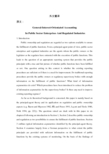
外文翻译原文:General-Interest-Orientated AccountingIn Public Sector Enterprises And Regulated Industries1. IntroductionPublic ownership and regulation are regarded as two options available to ensure the fulfilment of public functions. From a principal-agent point of view, public sector enterprises and regulated industries are the agents whom the public owners or the legislator as the regulator have entrusted with the execution of public functions. This leads to the question of an appropriate reporting system that provides the public principals with a true and fair picture of whether public functions have been fulfilled or not. One question arising in this context is whether the existing reporting procedures are suficient or if there is a need for improvement. Do traditional reporting procedures provide the public owners or regulatory supervisory bodies with enough information on the fulfilment of public functions? What kind of information asymmetries do exist? Which procedures have been introduced to reduce the problem of information asymmetries for the supervisory bodies? Is there any need to improve existing reporting regimes?As far as its theoretical background is concerned, this paper is mainly based on the principal-agent theory and its application on regulation and public ownership aspects (e.g. Baron and Myerson 1982, BÎs and Peters 1991, La¡ont and Tirole 1986, Noth 1994, pp. 223¡). The questions raised are dealt with in this paper in six chapters:Following an introduction in Section 1, Section 2 describes public ownership and regulation as two possibilities to ensure the fulfilment of public functions. Section 3 outlines typical information asymmetries identified by the principal-agent theory. Section 4 examines largely from a German perspective to what extent the public principals are provided with suficient information on the fulfilment of public functions by the existing systems of monitoring. On the basis of the findings ofSection 4, Section 5 looks at measures designed to improve the identified shortcomings of currently adopted procedures within the existing framework. Section 6 contains a summary.2 .Agents for public functionsAs mentioned above public sector ownership and regulation are two of the options the public principals have in discharging their duties. Other options are the execution of public functions through public administrations, public-law associations, authorisation of private economic entities or contract management. In the case of public sector enterprises central, regional or local authorities involve themselves as owners. Historically, public ownership has been the main mode of economic regulation in Europe (Majone 1996, p.11). The justification for the existence of public sector enterprises derives directly from the fact that they are agents for the fulfilment of public functions. A public sector enterprise which is exclusively profit -orientated needs to be privatised. According to the principle of subsidiarity it is not legitimate for the public authorities to involve themselves in exclusively shareholder value-maximising endeavours.Due to the legitimation of public sector enterprises by the fulfilment of public functions, performance or material objectives are the dominant entrepreneurial goals. The main task for public sector enterprises is the provision of goods and services for third parties. In public sector enterprises financial goals are only a precondition for their existence as an enterprise, but they are not accorded top priority.Their position as owners gives the public authorities the opportunity of laying down as corporate targets the public functions which are to be performed.Through enterprise-supervisory bodies the public owners have the possibility to monitor the fulfilment of public functions in all phases of the management cycle. Important decisions often need the approval of enterprise-supervisory bodies. Reporting obligation also establish a regular exchange of information between the management and the enterprise-supervisory body for the respective public sector enterprise. Regulation is often seen as an alternative to public ownership. In the case of regulation the public authorities do not involve themselves as owners but exert theirinfluence through sector-specific legislation. Typical normative or neo-classical reasons for regulation (Mïller and Vogelsang 1979, pp. 31 ¡, Knieps 1988, pp. 39 ¡, Krakowski 1988, pp.19 ¡) are, from awelfare economics point of view, market failures in the form of a sector's tendency towards a natural monopoly, information failures, negative externalities, cut-throat competition and inadequate provision of public goods by the market process. Market failures occur whenever the conditions of neo-classical welfare economics are not complied with. A broader concept of regulation is advanced by von Eynern and Thiemeyer. Von Eynern (von Eynern 1958, p. 6) justifies regulation not only to improve allocative eficiency, but also as a means to intrumentalise the regulated industries, irrespective of the ownership structure, via sector-specific legislation to ensure that public sector functions are fulfilled. Thiemeyer directly links regulation with the fulfilment of public tasks.Classical regulation instruments in Europe are market entrance and market exit permissions, compulsory contract obligations, price control systems, performance and quality standards, as well as various approval procedures, concerning for example the timetable of public transport or the terms of contract. In Germany, regulatory sectors comprise for example public utilities, banking and insurance industries as well as transportation and telecommunications.Special regulation laws provide the framework for regulation. All over Europe, specialised supervisory bodies in the form of parliamentary committees, inter-ministerial committees, public administrations (e.g.Norwegian Post and Telecommunication Authoritiy), independent bodies (e.g. Office of the Director of Telecommunications Regulation (Ireland), Office of Electricity Regulation (GB)) or sometimes public sector enterprises(e.g.Deutsche FlugsicherungGmbH,Osterreichische Gesellschaft fÏr Telekommunikationsregulierung m.b.H.) are entrusted with monitoring whether a regulated industry is operating according to the legislative requirements.The regulatory bodies'options to exert in£uence on the regulated industries are much more limited than in the case of public ownership. The regulatory bodies are not in a position to put the fulfilment of public tasks into the centre of the entrepreneurialobjectives of the regulated industries. As a result, the regulated industries do not regard themselves as direct agents committed to performing public sector duties. Regarding the possibilities to control public ownership offers better options for a public-function-orientated governance.3 .Information asymmetries in principal-agents relationsIn both alternatives for the fulfilment of public functions, under review here, a principal-agent relationship exists. The management of the public sector enterprises and regulated industries act as agents for the public owners and/or for the regulatory authorities, respectively. According toArrow (Arrow 1985, pp. 37 ¡) principal agent-relations can be described as follows:● there are two parties involved● the agent's actions affect the welfare of both parties● the principal observes the results of the agent's decisions and draws his conclusions from his findings. The agent's action is not directly observable by the principal● the outcome is affected but not completely determined by the agent's actions● normally the principal has to define the tasks carried out by the agent as well as the rule that specifies the fee to be paid to the agent before it comes to a contract● information asymmetries and uncertainties exist.Concerning access to information, the owners of public sector enterprises as well as the regulatory bodies both face the typical principal-agent problem, i.e. that the management is better informed than the public principal. Generally the principal-agent literature distinguishes the following types of information asymmetries (e.g. Stiglitz 1974, Holstrom 1979, Shavell 1979, Grosman and Hart 1983, Arrow 1985):Adverse selection: The agent uses his information advantage to influence the contract conditions to his advantage. For example, prior to a price approval decision a regulated utility can make use of its better knowledge of the company's cost structure and refrain from informing the regulatory institution about its price floor. In order to deal with this kind of information asymmetry the British Office of Electricity Regulation, for example, is empowered to adjust the approved Retail Price IndexMinus X (RPI-X) formula, if an enterprise misled the Office of Electricity Regulation by providing incomplete or inaccurate information at the time the price was set up (Error Correction Mechanism). The German Telecommunication law adresses the same problem in } 30 Telekommunikationsgesetz, which allows in the case of the market-dominating enterprise a price-readjustment process.The problem of adverse selection also occurs within public sector enterprises. For example proposals made by the management of public sector enterprises for decisions to be taken by the enterprise- supervisory bodies, can be worded in such a way that the management is give discretionary freedomto ensure the fulfilment of its individual objectives.4. General-interest-orientated reporting proceduresIn order to ensure the provision of public services it is necessary that the public principals are informed about the degree to which public sector enterprises or regulated industries have carried out public functions. A general-interest-orientated reporting system is required to put the public principals in a position to assess whether the public sector enterprises or regulated industries have been operating in compliance with their entrepreneurial or regulatory obligations. Reporting procedures on the fulfilment of public functions can help to reduce, though never remove, the principals' existing information asymmetries. To introduce general-interest-orientated reporting procedures is in line with the traditional governance literature, which stresses that only things which have to be reported get done.The agent's reporting obligations are one way for the principal to watch the agent's actions.They are a control mechanism facilitating the public principal's supervision of the public sector enterprises or regulated industries.5. Efforts for improved general-interest-orientated accountability5.1 Public enterprisesAs shown in the preceeding paragraphs, reporting on the fulfilment of public functions is dealt with in public sector enterprises in a way that needs to be improved. The lack of operationalised objectives is one problem, the unsuitability of the established accounting system another.。
国有企业会计监督体系的构建
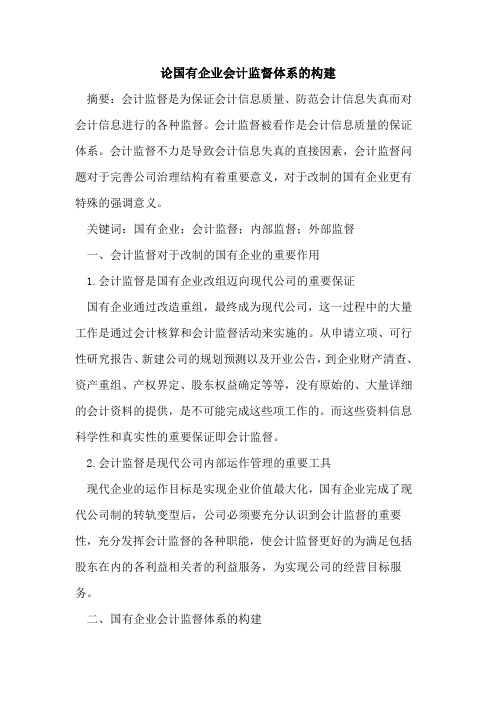
论国有企业会计监督体系的构建摘要:会计监督是为保证会计信息质量、防范会计信息失真而对会计信息进行的各种监督。
会计监督被看作是会计信息质量的保证体系。
会计监督不力是导致会计信息失真的直接因素,会计监督问题对于完善公司治理结构有着重要意义,对于改制的国有企业更有特殊的强调意义。
关键词:国有企业;会计监督;内部监督;外部监督一、会计监督对于改制的国有企业的重要作用1.会计监督是国有企业改组迈向现代公司的重要保证国有企业通过改造重组,最终成为现代公司,这一过程中的大量工作是通过会计核算和会计监督活动来实施的。
从申请立项、可行性研究报告、新建公司的规划预测以及开业公告,到企业财产清查、资产重组、产权界定、股东权益确定等等,没有原始的、大量详细的会计资料的提供,是不可能完成这些项工作的。
而这些资料信息科学性和真实性的重要保证即会计监督。
2.会计监督是现代公司内部运作管理的重要工具现代企业的运作目标是实现企业价值最大化,国有企业完成了现代公司制的转轨变型后,公司必须要充分认识到会计监督的重要性,充分发挥会计监督的各种职能,使会计监督更好的为满足包括股东在内的各利益相关者的利益服务,为实现公司的经营目标服务。
二、国有企业会计监督体系的构建1.单位内部会计监督单位内部会计监督可以分为所有者会计监督、债权人会计监督、经营者会计监督、职工会计监督和政府税务部门的会计监督。
首先对各利益相关者进行分类,认为经营者、所有者和职工属于公司内部人,因此他们的会计监督称为内部利益相关者会计监督,相应的债权人和政府税务部门的会计监督则称为外部利益相关者会计监督。
(1)经营者会计监督。
经营者会计监督则可以按不同层次进一步分为单位负责人的会计监督、会计机构和会计人员的会计监督以及内部审计部门和单位其他部门的会计监督等。
其中会计机构和会计人员的会计监督是经营者会计监督的基础,内审部门会计监督是单位负责人进行监督所利用的手段,经营者会计监督的效果与单位负责人的因素有密切的关系。
企业会计监督体系的构建
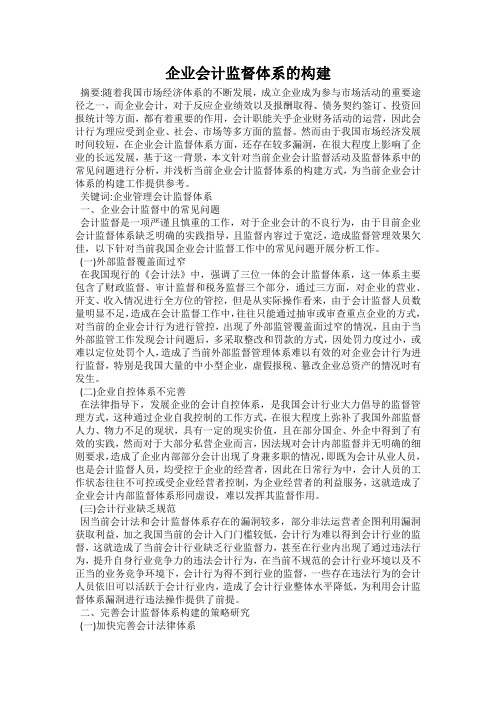
企业会计监督体系的构建摘要:随着我国市场经济体系的不断发展,成立企业成为参与市场活动的重要途径之一,而企业会计,对于反应企业绩效以及报酬取得、债务契约签订、投资回报统计等方面,都有着重要的作用,会计职能关乎企业财务活动的运营,因此会计行为理应受到企业、社会、市场等多方面的监督。
然而由于我国市场经济发展时间较短,在企业会计监督体系方面,还存在较多漏洞,在很大程度上影响了企业的长远发展,基于这一背景,本文针对当前企业会计监督活动及监督体系中的常见问题进行分析,并浅析当前企业会计监督体系的构建方式,为当前企业会计体系的构建工作提供参考。
关键词:企业管理会计监督体系一、企业会计监督中的常见问题会计监督是一项严谨且慎重的工作,对于企业会计的不良行为,由于目前企业会计监督体系缺乏明确的实践指导,且监督内容过于宽泛,造成监督管理效果欠佳,以下针对当前我国企业会计监督工作中的常见问题开展分析工作。
(一)外部监督覆盖面过窄在我国现行的《会计法》中,强调了三位一体的会计监督体系,这一体系主要包含了财政监督、审计监督和税务监督三个部分,通过三方面,对企业的营业、开支、收入情况进行全方位的管控,但是从实际操作看来,由于会计监督人员数量明显不足,造成在会计监督工作中,往往只能通过抽审或审查重点企业的方式,对当前的企业会计行为进行管控,出现了外部监管覆盖面过窄的情况,且由于当外部监管工作发现会计问题后,多采取整改和罚款的方式,因处罚力度过小,或难以定位处罚个人,造成了当前外部监督管理体系难以有效的对企业会计行为进行监督,特别是我国大量的中小型企业,虚假报税、篡改企业总资产的情况时有发生。
(二)企业自控体系不完善在法律指导下,发展企业的会计自控体系,是我国会计行业大力倡导的监督管理方式,这种通过企业自我控制的工作方式,在很大程度上弥补了我国外部监督人力、物力不足的现状,具有一定的现实价值,且在部分国企、外企中得到了有效的实践,然而对于大部分私营企业而言,因法规对会计内部监督并无明确的细则要求,造成了企业内部部分会计出现了身兼多职的情况,即既为会计从业人员,也是会计监督人员,均受控于企业的经营者,因此在日常行为中,会计人员的工作状态往往不可控或受企业经营者控制,为企业经营者的利益服务,这就造成了企业会计内部监督体系形同虚设,难以发挥其监督作用。
- 1、下载文档前请自行甄别文档内容的完整性,平台不提供额外的编辑、内容补充、找答案等附加服务。
- 2、"仅部分预览"的文档,不可在线预览部分如存在完整性等问题,可反馈申请退款(可完整预览的文档不适用该条件!)。
- 3、如文档侵犯您的权益,请联系客服反馈,我们会尽快为您处理(人工客服工作时间:9:00-18:30)。
外文翻译:国有企业会计监督体系的构建By Ron Kasnik 国有企业改革的基本方向是建立现代企业制度,公司制企业是现代企业制度的一种有效形式,公司法人治理结构是公司制企业的核心。
中国国有企业改制后,国有企业虽然建立了公司制,但国有企业法人治理结构尚存在诸多问题。
改制的国有企业治理结构不完善,导致了企业行为短视和不规范,不仅如此企业经营者还出于各种目的操纵会计工作,屏蔽财务会计真实信息,使得国有企业存在严重的会计信息失真问题。
企业会计信息失真造成国有资产大量流失,证券市场发育不良等,严重降低了会计信息质量,影响了会计信息使用者的正确决策,进而在客观上影响了国民经济运行秩序。
在当前会计信息普遍失真的情况下,企业一般来说主要面临着两个基本问题:一是完善会计流程;二是加强会计监督。
这两项职能都是处于一定的内部控制条件下的,内部控制环境是内部控制的前提和基础,加强内部控制环境建设,才能使内部控制得以顺利进行,各项会计任务才能有效实施,会计信息质量才能真正提高。
然而,目前我国理论界在讨论会计信息失真问题时,大多强调制度的建设,却在一定程度上忽视内部控制环境的作用或者将内部控制环境与内部控制制度混为一谈。
故此,本文将从研究内部控制环境入手,将内部控制环境与会计监督相结合,通过探讨内部控制环境各要素对会计监督的影响来寻找一些切实可行的方法以提高会计信息质量。
会计监督是为保证会计信息质量、防范会计信息失真而对会计信息进行的各种监督。
会计监督被看作是会计信息质量的保证体系。
会计监督不力是导致会计信息失真的直接因素,会计监督问题对于完善公司治理结构有着重要意义,对于改制的国有企业更有特殊的强调意义。
我国在从计划经济向市场经济转轨过程中,由于内部人控制的弊端,以及外部监督、中介组织的缺陷,导致会计委派制的产生有了现实意义。
但会计委派制单独运行也存在一些问题,无法满足现代化管理的需要。
应该正确认识内部审计的必要性,将会计委派制与内部审计二者相结合,发挥会计委派制的作用,强化内部审计工作,促进单位在管理分权条件下经营管理整体目标的实现。
财务监督机制改革是国有企业建立现代企业制度的关键,也是众多其它性质的企业能够发展的关键。
纵观近几年很多企业,有过辉煌的成绩,但都只是昙花一现,从中不难发现具有共同的特点,就是在构建现代企业制度过程中,缺乏应有的财务监督。
我国最早由深圳市政府为维护国有企业所有者利益,防止国有资产流失,用会计委派制的财务监督模式率先在部分国有企业中实行了财务总监制度或财务部长逐级委派制度。
目前,在一些国有企业中,特别是大中型集团化经营企业中,陆续建立了会计委派制度;另外,在一些非国有企业和公司制企业中,也尝试着建立会计委派制度。
中国有企业的财务监督体制经历了三个阶段,日趋达到完善。
第一阶段:80年代初-1988年。
这一阶段探索的结果表明,仅仅从企业层次着手是建立不起现代企业制度的,必须从宏观出发,建立合理的国有资产管理体制。
第二阶段:1988年-2003年。
此阶段运行中,各个部门均没有放权,如国有资产的资产权归财政部管,投资权归国家计委管,日常经营归经贸委管,人事权归企业工委管,多个部门可以对同一个企业发号施令,弊端颇多。
第三个阶段:2003年-当前。
这一阶段以建立国有资产管理新体制、建立健全现代产权制度、使股份制成为公有制的主要实现形式为核心任务。
2003年年初,国资委成立,之后三年,围绕调整国有经济布局结构,深化国有企业改革,加强国有资产监管三个方面进行了诸多的探索。
完善公司治理结构、加大企业为主体的科技创新、规范国有企业改制、加强对国有企业日常监管等方面均取得了显著的效果。
国有企业治理中仍存在很多没有解决问题,主要有以下几项。
第一项国有企业缺少竞争力与创新精神。
第二项国有企业建立产权结构多元化遇到了困难。
第三项国有企业的董事会和经理人在控制权的配置上难以形成合理的分配。
第四项国有企业资产管理基本法律体系仍不完善。
第五项国有企业的重组推进仍缓慢,国资委直接管理的国有企业数量仍太多。
以上问题造成了国有企业财务监督体制中出现了缺陷。
首先缺少对企业经营管理者重大财务决策行业的有效监督。
其次缺少对国有企业经营管理高层个人经济状况的监督。
再次缺少对国有企业虚假、隐瞒财务信息的有效监督。
同时中介财务监督机构也没有尽到应付的责任。
最后造成企业内部财务监督机构专职人员的地位与归属不一致。
财务监督评价系统划分为系统管理、个性工具、财务管理、客户服务、企业运营、企业发展、系统评价等7个子系统,系统管理包括部门管理,职务管理,人员管理,用户管理,用户组管理,菜单管理等功能;个性工具提供个人信息维护功能;财务管理、客户服务、企业运营、企业发展分别是针对企业财务状况、客户数据及关系、企业主营业务及增值业务、企业文化及人员方面的指标的编辑和评分;系统评分是显示系统的总得分,并且根据规定将当前财务监督水平划分到具体的等级。
国有企业会计监督失效是由诸多原因造成的,以公司治理为理念,对国有企业会计监督体系重新构建,建立了多元化、多层次的国有企业会计监督体系。
所谓多元化,是指会计监督主体由各公司治理主体、各政府部门以及司法部门组成:所谓多层次,是指会计监督中最基础的是会计机构和会计人员的会计监督,然后是经营者的会计监督,再次是除经营者之外的各利益相关者的会计监督,最后是单位外部会计监督,其中司法部门的监督是最高层次的会计监督。
在除经营者之外的各利益相关者的会计监督中,要强调国家所有者对国有企业的会计监督。
对于国有企业会计监督体系的设计,国有企业会计监督体系应以公司治理结构为依据,划分为单位内部会计监督和单位外部会计监督。
单位内部会计监督又分为内部利益相关者的会计监督和外部利益相关者的会计监督。
内部利益相关者的会计监督要在企业内部形成相互制约的机制。
单位内部会计监督即公司治理结构中的会计监督,不仅应满足经营者对经营管理的需要,同时还应满足各派利益相关者为维护自身经济利益而对经营者进行再监督的需要。
此外,由于中国国家所有者对国有企业会计监督的好坏是国企改革的重要问题之一,所以对于国有企业的会计监督还应能满足国家所有者对经营者加强监督的需要。
国有企业的会计监管模式是多方面的。
全面实施这些模式将会浪费资源,提高会计管理的难度。
针对性的选择两个或两个以上的会计监管模式来实现会计监督根据运行特点监督国有企业是非常必要的。
笔者认为,一般来说,内部审计系统是一个传统的系统。
如果你想选择系统分配的会计系统中,分配的监事会制度和外部董事系统,系统数量的选择更好的不超过两个。
与此同时,你就不需要实现分配会计师系统和调度的监事会制度在相同的企业,它不太合适,促进外部董事系统在较大范围的。
信息不对称理论表明,私人信息被察觉到的代理,隐藏的行动是无凭无据,因此带来的最大问题是投机行为。
因此,不需要强调国有企业会计监督的多种形式,但有必要强调实际结果,会计监管的效率,并限制代理的机会主义行为。
首先,任命和分配任务人员应迅速掌握企业的财务信息如财务业绩、经营成果、现金流量,熟悉企业的生产和经营活动。
其次,责任必须分配到个人,保障机制的实施措施应该被建立,某人应该分配给追踪、监督、检测和评价这一制度的实施。
建立一个国有企业的全国的会计监管专家的数据库,加强职业培训,在企业管理方面建立一个有高水平和丰富经验的专业的团队。
最后,在会计监督模式实施过程中所获得的各种各样的信息应该被共享。
国有资产监督管理委员会应组织各种交流会议,现场会议和研讨会,能吸引更多的任命和作业人员参加,磋商出现在会计监督和沟通措施中的问题并提出解决方案。
在所有权和管理权分离的情况下,内部控制理论告诉我们,企业董事在事实上或法律控制企业,并利用管理过程中有效的信息和设施,在企业的管理和决策中获得更多的利益。
会计监督是维护经济秩序,防止内部人控制以确保国有企业的经济活动正常进行。
国有资产监督管理委员会,人事任命和分配应该清楚地理解会计监督的性质和局限性。
会计监督应根据经济发展和企业的经济效益,专注于企业的长远利益。
监管不仅应该适当地,也应该适度进行,不应该直接干预或参与日常管理活动。
职员可以作为“裁判”,但不应该作为“参赛选手”,更不应充当二者的结合。
根据委托-代理理论,委托人需要代理人的帮助和合作以完成预期目标,委托人将使用一系列的奖励措施来激励代理人努力使得代理总体价值最大化,从而平衡委托人和代理人之间的关系。
在市场经济条件下,企业激励机制和约束机制的会计监督是十分重要的,并且和会计监管的效率直接相关。
会计监督的主体是人,所以在会计监督的过程中他们也需要被刺激和克制。
激励机制促进会计监督人员不断发现问题,并积极对抗会计舞弊。
约束机制使得会计监察人员的行动不应超过其法律法规的范围。
为了做好会计监督工作,首先,一个鼓励和支持任命人员履行职责应的法律应该被协调。
各种形式的激励机制,如发展优先就业,期权激励和回报之间的区别。
其次,应加强责任感,约束机制,比如职业禁令,行政处罚,和法律责任问责应该被建立,应加强问责制。
正确的财务管理目标,是企业财务管理系统良性循环的前提,也是财务管理机制赖以建立的基础。
根据利益兼顾原则,提出了公司财务管理目标的分层确定观点,即国有公司财务管理目标分为总体目标和具体目标两个层次。
总体目标分为实现公司价值最大化的经济目标和承担一定社会责任的社会目标两个层次。
具体目标中的经济目标包括公司在筹资、投资和分配管理方面的目标,具体目标的社会目标可分为最大限度地降低社会成本和提高社会效益。
国有公司财务监督机制是建立在内外财务监督关系基础之上的,监督机制的主要方式为审计监督。
在外部监督机制中,强调国家审计监督的“龙头”地位和依靠CPA社会审计监督主要力量,并对CPA中介监督出现的信誉危机问题,从国内外相关事件的分析中,查找原因,提出完善的对策。
内部监督机制中,应完善公司财务治理结构,保证股东(大会)、董事会、经理层及监事会等各层次监督主体有效行使监督权,同时应加强内部审计监督、会计监督和财务总监制度。
国有公司会计监督机制新模式:市场导向下利益相关者共同控制型模式,即综合激励的动力机制,运转顺畅的运行机制,内外结合的监督机制和科学合理的评价机制具有创新性。
原文正文:Construct of accounting supervision system ofstate-owned enterpriseBy Ron KasnikThe modern enterprise mechanism is the basic reform direction of state-owned enterprises in China. Corporation is one kind of effective form of modern enterprise mechanism, and corporate governance is the core of corporation. There are many problems in corporate governance of the state-owned enterprises, which make the operators manipulate the fiscal work and results in distortion of fiscal information. The distortion of fiscal information of enterprises can result in large quantities of state-owned assets leak, and then affect the right decision-making of the user. It is the popular phenomena that the accounting information can not reflect enterprises' true financial condition. Under this position, enterprise generally faces two basic problems:One is to develop the accounting process; the other is to strengthen the accounting monitoring. These two functions must be carried out under some internal control condition. Internal control environment is the foundation of internal control system. When internal control environment being developed, internal control system should run smoothly, and accounting measures should be effectively carried out. However, when discussing the problem of false accounting information, scholars pay more attention on developing accounting system; neglect the function of the internal control environment on accounting. Thus this article will integrate the internal control environment and accounting monitoring to find some practicable measure to improve the accounting quality.Accounting supervision is used as the system of guaranteeing the quality of fiscal information. The deficiency of accounting supervision is the direct factor resulting the distortion of fiscal information. Accounting supervision system is important to reforming state-owned enterprises.In the process for our country's economy' translation from planned economy to market economy, the internal control problems of external supervision and intermediary organization lead to the existence of the accountant appointment system. But running accountant appointment system separately can't meet the needs of modern management. We must combine the accountant appointing system with the internal auditing so as to promote the realization of the overall target of business management.Reforming the financial supervision system is the key to establishing the modern enterprising system. A lot of enterprises, which made brilliant achievements years ago, disappeared now, due to the lack of financial supervision. To secure the state-owned enterprise owners interests, to avoid the loss of state-owned assets, accountant appointment system of financial supervision mode was applied in some state-owned enterprises in Shenzhen. At present, accounting appointment system has been established or being established in some state-owned enterprises, especially large and medium-sized ones.The financial supervision system of state-owned enterprises has experiencedthree stages in our country, and to achieve perfect increasingly. The first stage: the early 80 s to 1988. The results of exploration in this stage show that it can't afford to establish modern enterprise system only from the enterprise level, but also proceed from the macroscopic and establish a sound management system for state-owned assets. The second stage: 1988 to 2003, In the operation this stage, each department don't give up the right, for example, the assets of the rights owned by the ministry of finance, the state-owned assets investment of the rights owned by the State Development Planning Commission, the day-to-day operations of the rights owned by the economic and trade commission, the staffing of the rights owned by the enterprise work committee, multiple departments can give orders to the same enterprise, So there were many disadvantages in this stage. The third stage: 2003 to now. The core task of this stage is to establish a new state-owned assets management system, establish and improve the modern property right system, make the joint stock system becomes the main form of public ownership. In early 2003, state-owned assets supervision and administration commission was set up, after three years, around the adjustment of state-owned economic layout structure, deepen the reform of state-owned enterprises, strengthen the supervision of state-owned assets of many trials were carried out in three aspects. Perfect the corporate governance structure, strengthening the scientific and technological innovation of enterprises as the mainstay, standardization of state-owned enterprise restructuring, strengthen the daily supervision in state-owned enterprises has obtained the remarkable effect.Our country still exist many unsolved problems in state-owned enterprise governance, mainly has the following several. The first item: the state-owned enterprises lack of competitiveness and innovation spirit. The second: problems for state-owned enterprises to establish diversified property rights structure. The third: the board of directors and managers of state-owned enterprises on the configuration of control is difficult to form a reasonable distribution. The fourth: basic management of state-owned assets law system is still imperfect. The fifth: the restructuring of state-owned enterprises forward is still slow, SASAC directly manage the number of state-owned enterprises is still too much.These problems caused the defects in the financial supervision system of state-owned enterprises. First of all, lack of enterprise operators and managers major financial decisions effective supervision of the industry. Secondly, lack of state-owned enterprises operation and management of high-level personal supervision of the state of the economy. There is lacking of effective supervision about the false and hiding financial information. Financial supervision and intermediary organization also did not deal with the responsibility. The final status of internal financial supervision institution full-time personnel does not agree with attribution.Financial supervision and evaluation system is divided management, personalized tools, financial management, customer into 7 sub-systems such as service, business operations, systems business development and system evaluation. System management includes sector management, job management, personnel management, user management, user group management and menu management; personalized tools provide personal information to maintain; the system consists of four sub-modules, namely financial management, customer service, business operations and business development, and respectively edits and rates for financial position, customer data and relationships, the main business enterprises and value-added services, corporate culture and personnel indicators; system score is the total score of system, and in accordance with the provisions of the current level of financial supervision divided into specific grades.There are many factors causing the deficiency of accounting supervision in state:-owned enterprises. The thesis points out the present deficiency of accounting supervision in state-owned enterprises concentrated on the research of accounting supervision system in state-owned enterprises, and establishes multiple accountant supervision systemThe thesis suggests that the dividing between exterior accounting supervision and internal accounting supervision in state-owned enterprise should be based on corporate Corporation The accountant supervising of internal corporation should satisfy the needs of both the operators' management and protecting the individual interest of each interest group.Accounting supervision modes of state-owned enterprises are various. Full implementation of these modes would be a waste of resources, increase the difficulty of accounting management. It’s necessary to targeted select two or more accoun ting supervision modes to implement accounting supervision according to operation characteristics of the supervised state-owned enterprises. The author believes that, generally, the internal audit system is a conventional system. If you want to select systems among the assigned accountant system, assignment board of supervisors system and outside director system, the number of systems chosen is better no more than two. At the same time, it’s no need to implement assigning accountants system and dispatching board of supervisors system in the same enterprise, and it’s inappropriate to promote outside director system in a large scale.Asymmetric information theory suggests that private information possessed by agents is unobservable, hidden action is unverifiable, thus the biggest problem brought is the opportunistic behavior. Therefore, it’s not necessary to emphasize the diversified forms of accounting supervision of state-owned enterprises, but necessary to emphasize the actual results, the efficiency of the accounting supervision, and limit opportunistic behavior of agents. Firstly, the appointment and assignment personnel should quickly master financial information of the enterprise such as financial results, operating results and cash flow, and be familiar with production and business activities of the enterprise. Secondly, the responsibilities must be assigned to individuals, safeguard mechanisms for implementation should be established, and someone should be assigned to track, supervise, inspect and evaluate the implementation of the system .Thirdly, establish a national accounting supervision expert’s database of state-owned enterprises, strengthen job training, and build a professional team of high-level and rich experience in business management. Finally, the information acquired in implementation of a variety of accounting supervision modes should be shared. State Asset Supervision and Administration Commission should organize a variety of communication meetings, on-site meetings and seminars which can attract a lot of appointment and assignment personnel to participate in, to consult problems appearing in accounting supervision and communicate measuresagainst the problems.In the case of separation of ownership and management, insider control theory tells us that directors of enterprise in fact or in law control the enterprise, and make use of available information and the facility of management to gain more interests in enterprise management and decision-making. Accounting supervision is to maintain the economic order and prevent insider control to ensure normal economic activity of state-owned enterprises. State Asset Supervision and Administration Commission, the personnel appointed and assigned should clearly understand the nature and limits of accounting supervision. Accounting supervision should be based on the economic development and economic efficiency of enterprises, and focus on long-term interests of enterprises. Regulation not only should be in place, but also moderate, and should not directly interfere or participate in the daily management activities. The personnel can act as "judge," but should not act as "athletes", neither act as a combination of both.According to principal-agent theory, as the principal need the help and cooperation of agents to accomplish the intended goal, the client will use a series of incentives to motivate agents to work hard to maximize the value of the overall agent, so as to achieve a balanced relationship between principal and agent. Under the circumstance of market economy, incentive and restraint mechanisms of accounting supervision are particularly important and directly related to the efficiency of the accounting supervision. The subjects of accounting supervision are human beings, so they also need to be stimulated and restrain efficiency of the accounting supervision. The subjects of accounting supervision are human beings, so they also need to be stimulated and restrained in accounting supervision activities. Incentive mechanism promotes accounting supervisory staff to continually identify problems, and actively fight against accounting fraud. Restraint mechanism makes the actions of accounting supervisory personnel do not exceed the scope of laws and regulations. To do a good job of accounting supervision, first, a law of encouraging and supporting appointed personnel to perform their duties should be coordinated. Various forms of incentive mechanisms, such as the priority in employment, option incentives and differencebetween the rewards, should be developed. Second, the sense of responsibility should be strengthened, restraint mechanisms such as occupational ban, administrative penalties, and legal liability accountability should be established, and accountability should be intensified.As to system of financial management, the proper goal is not only the premise of guaranteeing good cycle but also the basement of foundation. The chapter puts forward a idea to finish corporate goal of finiancial management step by step according to principle of making overall interates into consideration. It can be divided state-owned goal of financial statement into overall and idiographic goal. The overall goal can be separated into economic goal which need make the value of company to be maximum and social responsibilities goal which is shouldered by company. The idiographic goal is also separate into economic goal which includes raising money, investing and allocating management and social goal that reduces social costs and enhances social benefits.The mechanism of finiancial surveillance of state-owned corporations bases on the finiancial surveillance relations between inside and outside, and the principle way is audit surveillance. It focus on the market leadership that audit surveillance can own and the power of surveillance of social audit that dependes on CPA during the procedure of exterior surveillance mechanism. At the same time, it not only consummates the structure of governance corporation and but also enforces system of interior audit surveillance, accounting surveillance and CFO in interior mechanism of surveillance.The fields of innovation in the paper: The paper constructs the new model of financial management of state-owned corporate-model of controlling with together on related man to corporations, which includes the mechanism of power of financial management, the operation mechanism, the mechanism of financial surveillance relations between inside and outside and the mechanism of scientific valuation.。
